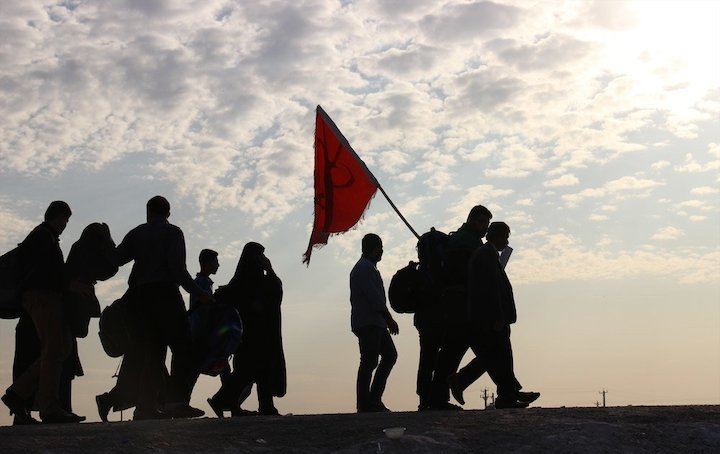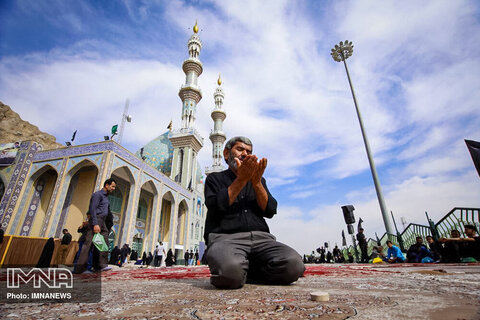Iran (IMNA) - During the past years, Iranian and Iraqi people from all walks of life have managed to take part in processions held in the run-up to the Day of Arbaeen, which arrives 40 days after the Day of Ashura, which marks the martyrdom anniversary of Imam Hussein (AS), the grandson of the Prophet Mohammad (PBUH) who was martyred in the Battle of Karbala on October 10, 680 (Muharram 10, 61 AH), nearly 14 centuries ago.
But this year, the Iranians are unable to participate in the Great Walk of Arbaeen due to coronavirus-related travel restrictions in Iraq and Iran. Each year, millions of Iranians flock to western and southwestern Iranian provinces bordering Iraq and then travel to the Iraqi city of Karbala on foot from there. This year, a few numbers of Iranians headed to the border crossings with Iraq in an effort to travel to Karbala. But the borders were closed due to coronavirus restrictions. This happened despite the fact that Iranian officials have warned the pilgrims against heading to the borders.
In late September, the Iranian police chief asked pilgrims not to go to border crossings because the police will prevent them from crossing the borders due to the outbreak of Covid-19 in neighboring Iraq.
Iran and Iraq both are facing a new wave of Covid-19 infections. On Tuesday, the Iranian Health Ministry announced 227 new Covid-19 deaths, raising the fatalities to 27,419. It also reported a record high number of 4151 new daily infections over the past 24 hours, bringing the total number to 497,825.
Iraq with a population half of Iran has reported similar numbers. On Tuesday, the Iraqi Health Ministry announced 4,172 new daily Covid-19 infections, raising the total number to 387,191. According to the ministry, 9,531 Iraqis have lost their lives due to the novel coronavirus so far.
In light of these numbers, Iran and Iraq have closed their borders, effectively banning the Arbaeen ceremony, which is considered as a special day in the calendars of both Iran and Iraq. Of course, Iraqis, unlike the Iranians, are allowed to take part in the Great Walk of Arbaeen given that the holy shrine of Imam Hussein (AS) is located in their country.
But the Iranian people, who used to stage stately Arbaeen processions, are not going to travel to Iraq. They are not giving up. They have launched online campaigns to honor the memory of Imam Hussein (AS), whose martyrdom played a tremendous role in turning the animosity between Iran and Iraq into amity over the past years, especially after the overthrow of Saddam Hussein’s regime in Iraq in 2003.
The two countries fought a deadly war in the 1980s after the Saddam regime invaded Iran. The Iran-Iraq war was the longest conventional war and the second-longest war of the twentieth century, which resulted in hundreds of thousands of people from both sides losing their lives.
But the Arbaeen ceremony created unprecedented amity between the Iranian and the Iraqi people as millions of Iranian pilgrims each year – with the exception of this year- visit Iraq and socialize with their Iraqi coreligionists. Most of these pilgrims have been accommodated in Iraqis’ own houses, creating a unique opportunity for both sides to closely know each other.
Thanks to the Arbaeen ceremony, Iraqis and Iranians broke away from the past, creating the largest religious gathering in the world during each Arbaeen. These strong bonds have been further strengthened over the past few years, especially after the emergence of the Daesh terrorist group when Iran rushed to help Iraqis thwart the attack of the group, which was marching toward Baghdad after occupying large swaths of the Iraqi territories. Iran gave weapons and logistic support to Iraq to help defeat Daesh.
Nouri al-Maliki, the former Iraqi prime minister, during whose tenure Daesh occupied large territories of Iraq, has praised Iran for opening its arms depots to the Iraqis during the war against Daesh.
“Daesh has come [to Iraq] because they [Americans] stopped all types of military support to Iraq and undercut the foundation of the Iraqi army,” the former prime minister said in June, adding, “Washington told the Iraqi delegation; as long as al-Maliki is in power, they will not give weapons to Baghdad to fight Daesh. This is all while Iran and Russia have opened their arms depots to Baghdad in support of the Iraqi army and the Popular Mobilization Forces.”
In return, Iraq is helping Iran get through the economic pressure that the U.S. put on it. Trade between Iran and Iraq now stands at $12 billion a year. During a meeting with Iraqi Prime Minister Mustafa al-Kadhimi in June in Tehran, President Hassan Rouhani said Iran and Iraq are willing to increase bilateral trade to $20 billion up from the current $12 billion.
During his visit, al-Kadhimi also praised the security cooperation between Iran and Iraq and their economic ties.
“We fought against terrorism and Takfiri groups, and Iran was the first country to stand by Iraq in this fight. We will not forget this. That’s why Iraq is standing by Iran so that it tackles its economic challenges. Iraq has become a market for Iranian goods,” he said.
As they commemorate the Day of Arbaeen, Iran and Iraq stand ready to protect the strong relationship they built since 2003 and keep alive the memory of Imam Hussein (AS), who became a symbol of their friendship.

Tehrantimes


Your Comment